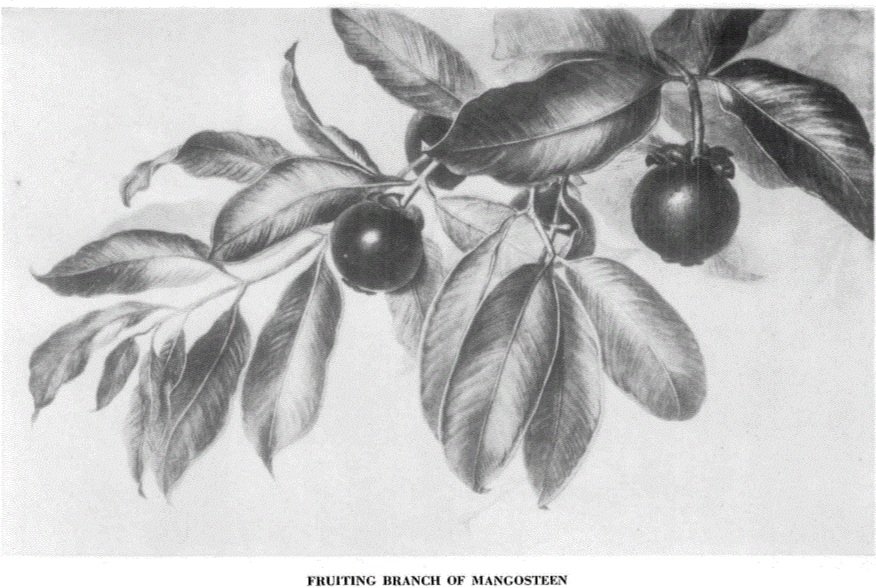My introduction to the mangosteen wasn’t quite as dramatic as that of Henry Adams. But it was still pretty satisfying.
In 1891, having journeyed from Boston to Oceania by sea, the writer and historian pushed onward to the Indonesian island of Java. What greeted him initially was a feeling of disappointment. Looking around, he was unimpressed with the architecture, lamented an absence of antiquities, and saw no art to his liking. This detour, Adams feared, was shaping up to be a wash; even the first fruit he sampled, the ever-divisive durian, left him reeling.
Then came a sweet, juicy epiphany.
“The mangosteen quite repays a week, or perhaps ten days, of seasickness,” he wrote, falling deeper under the fruit’s trance with each passing bite. “It is like a Japanese purple-lacquered fig, with a ball of white sherbet inside. From a sense of duty, I have eaten as many as I could… To me, the mango is prose, while the mangosteen is poetry.”
He likely wasn't the first (and certainly wasn’t the last) to be shocked and delighted by the strange fruit. Forty years later the botanist David Fairchild also made bold proclamations about the mangosteen’s powers. No stranger to exotic crops—Fairchild would go on to introduce pistachios, nectarines, dates, and more to the US—he raved: “It is so delicate that it melts in the mouth like ice cream. The flavor is quite indescribably delicious. There is nothing to mar the perfection of this fruit.”
It really is that good. What’s especially strange, however, is that nobody really knows where it came from. What we’re left with is approximations (probably either Malaysia or the Sunda Islands of Indonesia) and occasionally-fruitful attempts to harvest its trees abroad. So when I was presented with a rather unassuming plastic bag of deep red delicacies, I was confused. Then I was embarrassed because I hadn’t the faintest idea of how to consume what lay in my hands. Let me set the scene.
A couple of years ago, I was playing tennis semi-regularly with a few faculty members from the Ho Chi Minh University of Economics and Law. I got to know them through my friend Khoi, who had once been a student of theirs. Now a banker, he took part in their matches some Tuesdays and Thursdays and kindly invited me. This was both a generous offer and a logistical win; matchplay took place on a single, hidden court next to Lê Văn Tám park. This secretive court was manned by many unsmiling parking dudes in light blue uniforms and a mean-looking dog. But it was a five-minute walk from my apartment, and I never could’ve booked it myself.
Dr. Dung, the oldest of the bunch, was my de facto doubles partner. The most communication that generally took place was me sprinting back to retrieve a lob, then him shouting “Sam! Good!” Another guy smoked cigarettes between sets, which was very cool. A cat kept running across the baseline between points. One especially sweaty evening, there were just three of us; as the youngest player present by a couple dozen years, I was assigned to do the running and play 1-on-2. No stress, but for whatever reason, they decided it would be fair that the doubles alleys remain in play for both sides.
After an hour, I was drained and sweating to a degree that I believe may be illegal in some jurisdictions. Then, during a lull, Dr. Dung pulled out several bushels of lychee and mangosteen and motioned for me to join him on the bench.
I went for the lychees first, which were shockingly refreshing in their raw form (my past experience with the lychee came primarily from overpriced cocktails that I ordered to make myself seem normal on dates (if it’s my choice, I’m always opting for a beer)). After observing and failing to understand what lay beneath the hard exterior of the mangosteen, the rest of the guys mercifully handed me a ready-to-eat specimen. And much like David Fairchild and Henry Adams before him, I was an addict at first bite. Before long, I probably looked like one of those old Gatorade commercials where the basketball players are sweating sport drink, but in this case it was the drippings from a perfect tropical fruit.
For a few months thereafter, anytime I passed a street vendor pushing an overflowing cart I stopped to procure a few handfuls. It was all I could do to make up for lost time. As summer comes to a close on a different continent, I’m still trying to recreate that high.

